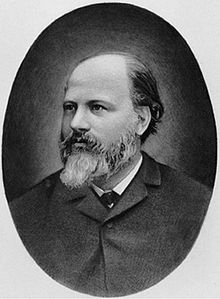Tommy Fallot
Tommy Fallot (born October 4, 1844 in Fouday , † September 3, 1904 in Mirabel-et-Blacons ) was a French Protestant pastor . He was one of the founders of religious socialism .
Life
Tommy Fallot was born in the French village of Fouday . He was the great-grandson of the Swiss politician and industrialist Johann Lukas Legrand and the grandson of Daniel Legrand . In the villages of the county of Ban de la Roche , he was made familiar with the social problems caused by industrialization very early on .
In 1872 he completed his theology studies in Strasbourg with his doctoral thesis on the poor and the gospel and then became a pastor in the Lutheran congregation in Waldersbach, Germany at that time . In 1876 he joined the Église évangélique libre and worked as a pastor at the Chapelle du Nord in one of the working-class districts of Paris . There he came into contact with the Mission populaire évangélique (Evangelical People's Mission) founded by the Protestant British pastor Robert Whitaker McAll . On request McAlls he worked for five years in the district of La Villette , where he in addition to his parish helped materially and morally poor population resident there. Yet he also saw the dangers of over-zealous evangelization . Since theological and ecclesiastical questions were pushed into the background in this, there were divisions in French Protestantism .
From 1882 Fallot, encouraged by Josephine Butler , dealt with the problem of prostitution and founded the Ligue française pour le relèvement de la moralité publique (French league for raising public morality). But he was increasingly concerned about the workers. So he pleaded for a Christian socialism and placed social justice as a political goal in the foreground. At the same time he condemned the excesses of revolutionary socialism. Also in 1882 he founded Le Cercle socialiste de la libre pensée chrétienne , a name that met with criticism and was therefore renamed Société d'aide fraternelle et d'étude sociale . Fallot repeatedly referred to the gospel in his social work . He received support from well-known personalities such as Professor Raoul Allier and the pastors Charles Wagner , Wilfred Monod , Elie Gounelle and Jules Jézéquel. But a large part of conservative and bourgeois Protestantism turned against him. Nevertheless, Fallot and the pastors who supported him founded the Solidarités , houses in which people of different denominations and worldviews met and helped each other.
After twelve years of intensive work, Fallot's health was compromised and in 1889 he applied for a pastor's position in a village. He was also disappointed that his social ideas found little attention in institutional Protestantism.
He was given a parish position in Sainte-Croix , then in Aouste-sur-Sye in the Drôme department , where he spent the last ten years of his life preaching the gospel to the village population. In several of his writings from this time he advocated ecumenism and a union of the various currents in the Reformed Church of France . He died on September 3, 1904 in Mirabel-et-Blacons . His pastoral office was taken over by his nephew Marc Boegner .
Fonts (selection)
- Les pauvres et l'Évangile , 1872.
- La femme esclave , 1884 ( digitized version ).
- La réglementation de la prostitution: lettre au rédacteur en chef du journal 'Le Havre' , 1885.
- Simple explication: trois lettres à un ami , 1893.
- Qu'est-ce qu'une Église? : un chapitre de christianisme pratique , 1897.
- Pour aider à l'organisation de l'effort missionnaire en France , 1899.
- Christianisme social. Études et fragments , 1911 ( digitized ).
literature
- Marc Boegner : La vie et la pensée de T. Fallot. 2 volumes. Berger-Levrault et al., Paris 1914–1926.
- Christophe Chalamet: Revivalism and Social Christianity: The Prophetic Faith of Henri Nick and Andre Trocme. Wipf and Stock, Eugene 2013, pp. 13-18.
Web links
- Tommy Fallot (1844-1904) in the Virtual Museum of Protestantism (Retrieved June 23, 2012)
- Life (Retrieved June 23, 2012)
| personal data | |
|---|---|
| SURNAME | Fallot, Tommy |
| BRIEF DESCRIPTION | French Protestant pastor |
| DATE OF BIRTH | October 4, 1844 |
| PLACE OF BIRTH | Fouday |
| DATE OF DEATH | September 3, 1904 |
| Place of death | Mirabel-et-Blacons |
